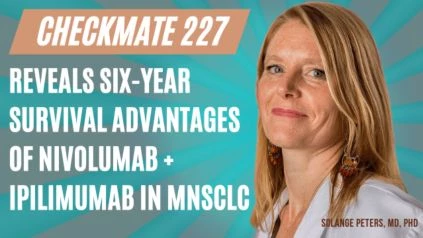In a conversation hosted by Allen Wilbanks, Solange Peters, MD, PhD, a full professor and chair of medical oncology specializing in thoracic malignancies at the University Hospital of Lausanne in Switzerland, discussed the remarkable findings from the CheckMate 227 trial, particularly the six-year outcomes of Nivolumab and Ipilimumab as first-line treatment for metastatic non-small cell lung cancer.
Dr. Peters emphasized that Nivolumab and Ipilimumab, being chemotherapy-free, offer an intriguing approach based solely on immune responses. Another key aspect is that the treatment stops at two years, allowing researchers to evaluate the long-term effects of promoting an immune response.
Regarding the use of chemotherapy in combination with Nivolumab and Ipilimumab, Dr. Peters stated, “The feeling we have is chemotherapy does not add so much. So when you have this dual immunotherapy, provided that response is reached, I think the long-term benefit is really related to the immunotherapy part.”
In summary, Dr. Solange Peters highlighted three key takeaways for oncologists:
- Long-term survivors in lung cancer exist, thanks to immune responses achieved through immunotherapy.
- Not all patients require Ipilimumab in addition to Nivolumab, but negative PD-1 patients are likely to benefit from CTLA-4 inhibition.
- CheckMate 227 provides valuable six-year data, reinforcing the role of immunotherapy in achieving long-term benefits for metastatic non-small cell lung cancer patients.

